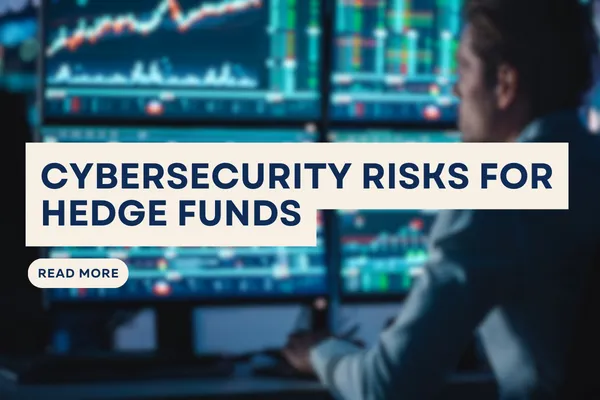Hedge Fund Buyer Blogs

Cybersecurity Risks for Hedge Funds
Introduction
Cybersecurity is not just an IT concern; it's a pivotal aspect of operational integrity and investment performance. As financial powerhouses, hedge funds are prime targets for cybercriminals, and the implications of a breach can be catastrophic. Here we dissect the cybersecurity risks specific to hedge funds and the measures essential to fortify their digital defenses.

The Attractiveness of Hedge Funds to Cybercriminals
Hedge funds, with their vast reserves of capital and sensitive financial data, present a highly attractive target for cybercriminals. These sophisticated investment vehicles manage billions of dollars, making them lucrative targets for financial theft.
Moreover, the confidential information they hold about investment strategies and client portfolios is invaluable for market manipulation or espionage. Cybercriminals, recognizing the potential for immense financial gains, are increasingly directing their focus towards these funds. The allure lies not just in the immediate financial reward, but also in the strategic value of the information, which can be exploited in various malicious ways. This reality places hedge funds in a precarious position, necessitating stringent cybersecurity measures to protect their assets and maintain the trust of their investors.
Targeted for Wealth and Information
Hedge funds manage substantial sums and sensitive data, making them attractive targets. Cybercriminals are enticed by the potential for financial gain and market manipulation through stolen information.
The Spectrum of Cyber Threats
Posing a constant challenge to their operational security. These threats range from phishing and social engineering attacks, where attackers deceptively gain access to sensitive data, to more aggressive forms of cyberattacks like ransomware. Ransomware, in particular, has emerged as a formidable threat, encrypting vital data and crippling trading systems until a ransom is paid.
Additionally, insider threats, stemming either from deliberate malicious actions or unintentional negligence, represent a significant risk. These insiders can exploit their access to inflict serious damage from within the organization. As hedge funds navigate through this intricate digital threat landscape, understanding and preparing for these varied cyber risks becomes crucial to safeguard their assets and maintain the integrity of their operations. This array of cyber threats underscores the need for comprehensive and proactive cybersecurity measures in the hedge fund industry.
Phishing and Social Engineering Attacks
Cyber adversaries frequently employ phishing tactics, targeting employees to gain unauthorized access. Through deceptive communications, they can infiltrate networks and acquire confidential data.
Ransomware: A Growing Menace
Ransomware attacks, wherein malicious software encrypts data demanding a ransom for its release, can halt hedge fund operations. The loss of access to critical data and trading systems can lead to financial and reputational damage.
Insider Threats: The Enemy Within
Insiders, whether malicious or negligent, pose a significant risk. They have the potential to bypass security measures and inflict harm from within the organization.
The Operational Impact of Cyber Incidents
The operational impact of cyber incidents on hedge funds extends beyond immediate financial losses. When these sophisticated financial entities fall victim to cyberattacks, the repercussions can be multifaceted and long-lasting.
Firstly, there's the tangible financial damage stemming from theft, ransom payments, and the potential paralysis of trading activities. Moreover, these incidents can severely tarnish a fund's reputation, shaking investor confidence and possibly leading to significant capital withdrawals.
Beyond these, there's the specter of regulatory consequences. In the wake of a cyber breach, investigations often uncover lapses in compliance with stringent data protection and cybersecurity regulations. These regulatory breaches can result in hefty fines and legal challenges, further compounding the fund's woes.
Such incidents underscore the criticality of robust cybersecurity measures in safeguarding not only the financial assets but also the operational continuity and regulatory compliance of hedge funds. This complex interplay of financial, reputational, and legal risks highlights why cybersecurity is an indispensable pillar in the modern hedge fund's operational strategy.
Financial Loss and Reputation Damage
A cyberattack can result in direct financial loss from theft, ransom payments, and operational disruption. Additionally, the reputational damage can erode investor confidence and lead to capital withdrawal.
Regulatory and Legal Repercussions
Post-breach investigations may reveal non-compliance with regulations, leading to fines and legal action. The increasing rigor of data protection laws means that hedge funds must prioritize cybersecurity to avoid regulatory pitfalls.
Mitigation Strategies: Fortifying Cyber Defenses
Fortifying cyber defenses is paramount to ensuring operational continuity and safeguarding investor trust. Mitigation strategies encompass a comprehensive approach, beginning with the adoption of robust security frameworks like the NIST Cybersecurity Framework. These frameworks provide a structured methodology for identifying, protecting, detecting, responding to, and recovering from cyber threats.
Investing in advanced cybersecurity technologies, such as AI-driven threat detection systems, is also crucial. These systems offer proactive monitoring and rapid response capabilities, essential in the fast-paced financial sector.
Equally important is cultivating a culture of security awareness among employees. Regular training and awareness programs can transform staff into an informed first line of defense, capable of identifying and mitigating potential threats. Collectively, these strategies form a multi-layered defense mechanism, essential for hedge funds to thrive securely in the digital age.
Implementing Robust Security Frameworks
Adopting comprehensive security frameworks, like the NIST Cybersecurity Framework, helps hedge funds establish robust cybersecurity practices.
Investing in Advanced Cybersecurity Technologies
Deploying cutting-edge technologies, such as AI-driven threat detection systems, can provide hedge funds with the tools to identify and neutralize threats proactively.
Fostering a Culture of Security Awareness
Regular employee training on cybersecurity best practices is crucial. An aware and vigilant workforce is the first line of defense against cyber threats.
The Role of Continuous Monitoring and Response
The role of continuous monitoring and response cannot be overstated. This proactive approach involves vigilantly scanning the cyber landscape to detect potential threats in real time. It's akin to having a digital watchtower that offers a panoramic view of the hedge fund's network, ensuring that any unusual activity is spotted and addressed promptly.
This constant vigilance is crucial because the speed of response can often mean the difference between a minor security blip and a catastrophic breach. Moreover, continuous monitoring is not just about warding off external threats; it also involves scrutinizing internal activities to preempt any insider risks. By integrating advanced technologies like AI and machine learning, this strategy becomes even more potent, allowing for the detection of sophisticated cyber threats that traditional methods might miss.
In essence, continuous monitoring and response act as the hedge fund’s digital immune system, ceaselessly guarding against the myriad of cyber threats that lurk in the shadows of the digital world, thus ensuring the integrity and stability of their operations.
1. Proactive Threat Identification and Mitigation
Continuous monitoring in a hedge fund environment involves the relentless scanning and analysis of network activity to identify potential threats or anomalies. For instance, if an unusual pattern of data access or transfer is detected, the system can flag it for immediate review. This proactive approach allows for the swift identification of potential cyber threats, such as unauthorized access attempts or signs of a developing ransomware attack. Once identified, the response team can quickly isolate affected systems, assess the threat, and implement measures to neutralize it, thereby minimizing potential damage.
2. Real-time Compliance and Risk Management
For hedge funds, compliance with financial and data protection regulations is critical. Continuous monitoring plays a vital role in ensuring ongoing adherence to these regulations. By constantly reviewing system logs and user activities, the fund can ensure that all operations remain within the legal framework. This real-time oversight helps in quickly identifying and rectifying any compliance breaches, thus avoiding potential legal penalties. Additionally, it assists in risk management by providing up-to-date information on the fund's security posture, allowing for timely adjustments in response to emerging cyber threats.
3. Incident Response and Recovery
In the event of a security breach, continuous monitoring systems can provide invaluable data for incident response teams. These systems can help pinpoint the origin and scope of the attack, thereby guiding the response efforts. For example, in a case where sensitive client data is compromised, the monitoring system can provide a clear trail of the breach, enabling a faster and more efficient response. This rapid response is crucial not only in mitigating the immediate impact of the breach but also in aiding the recovery process by providing insights into the weaknesses that were exploited, which can be addressed to prevent future incidents.
Conclusion: Ensuring Resilience in the Digital Age
For hedge funds, the question is not if but when a cyberattack will occur. In an era where digital threats are evolving rapidly, it is imperative for hedge funds to bolster their cybersecurity measures. By understanding the risks, investing in defenses, and cultivating a culture of cyber awareness, hedge funds can safeguard their assets and maintain their role in the global financial ecosystem with confidence.
Get In touch

Hedge Fund Buyer
(803) 310-7106
100 Old Cherokee Rd

